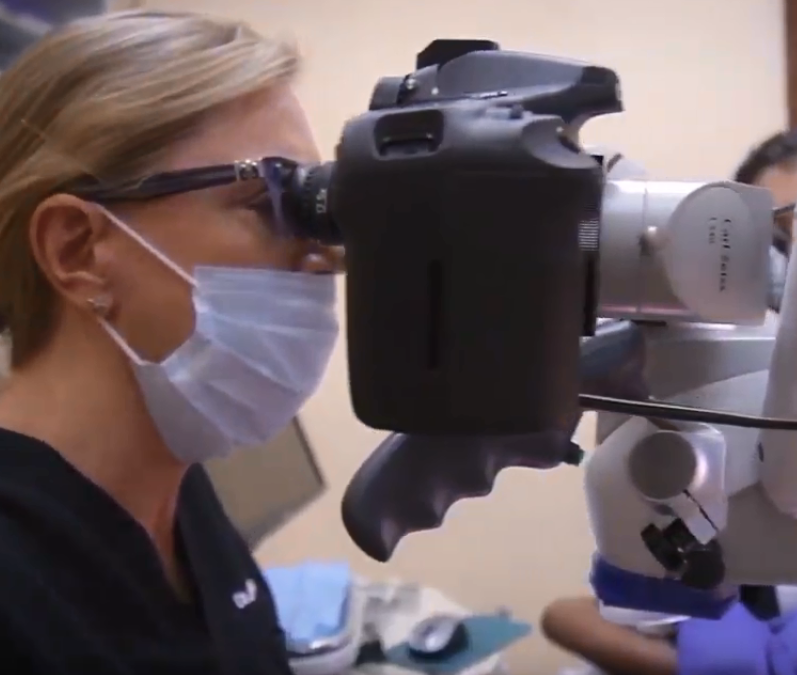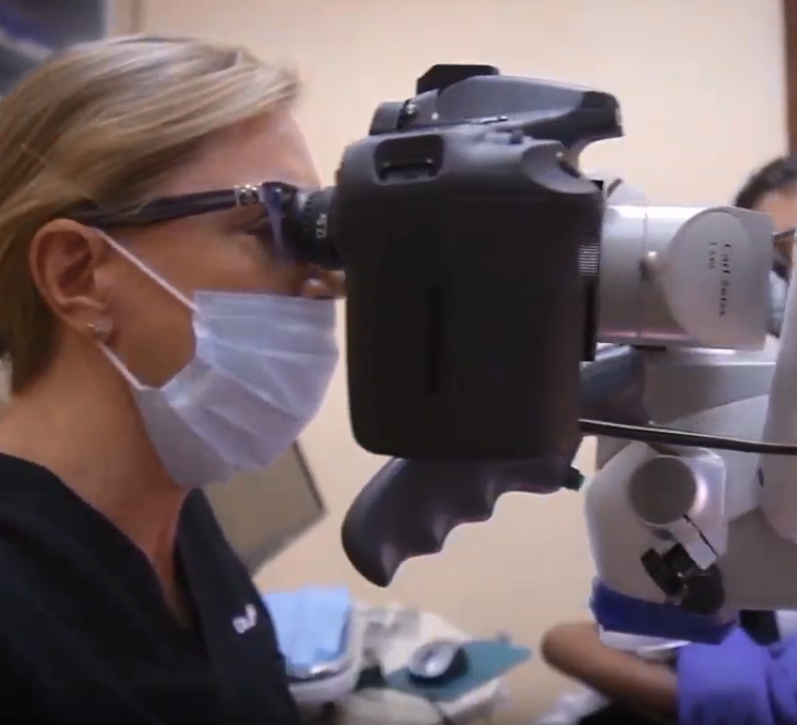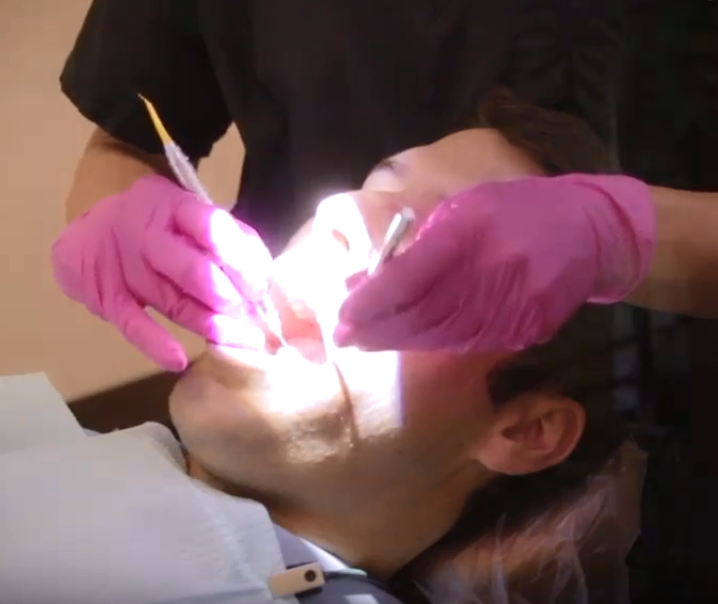
by Dr. Jacqueline S. Allen | Jul 20, 2020 | Blog, Dental Implants, Endodontist, Phoenix Endodontic Group
For those struggling with problems with natural teeth, one question can become paramount: “Should I have an endodontist treat my tooth with a root canal, or should I consider getting a dental implant?”

The decision-making process related to a dental implant involves many factors. However, there are numerous situations in which a dental implant is clearly a strong choice to rectify your dental challenges, some of which are discussed below.
Situations That Support Choosing A Dental Implant
- Earlier attempts to save your natural tooth have been unsuccessful. If your natural tooth continues to have serious infection issues after a root canal or a root canal retreatment, it may be time to consider an implant.
- You have had gum disease around the impacted tooth/teeth. The declining health of your gums can damage your periodontal ligament, which plays a crucial role in attaching the roots of your tooth to your jaw. If the ligament cannot regenerate itself successfully, it becomes much harder to retain a natural tooth.
- You are not a strong candidate for a fixed bridge or a partial set of dentures. If you are struggling with one or several teeth adjacent to each other, it might seem more cost-effective to try a fixed bridge or partial dentures. However, not everyone can tolerate the feel of dentures and the care they require, and the alterations required for a fixed bridge require the adjacent teeth to be structurally sound.
- Your natural tooth is already gone. If you have already lost your tooth, a dental implant can play a key role in preventing further tooth loss and bone deterioration in the jaw. Unreplaced teeth can cause the remaining teeth to crowd together and can obviously interfere with clear speaking or eating a normal diet.
- You are in danger of losing an entire arch of natural teeth. In some cases, the more natural teeth you have that are in poor shape, the less likely a solution other than a dental implant will work. Dental implants can be customized to replace anything from one tooth to an entire arch of teeth.
“The question of how to treat failing natural teeth has an answer unique to each patient,” says Dr. Jacqueline S. Allen, who practices with the Phoenix Endodontic Group. “We can perform in-depth examinations and provide evidence-based treatment plans whether a dental implant, a root canal, or another type of intervention will provide the best long-term results.”

by Dr. Jacqueline S. Allen | Jun 24, 2020 | Blog, Endodontics, Endodontist, Phoenix Endodontic Group, Root Canal
Root canals are often the treatment of choice when you develop a serious infection involving your natural tooth’s pulp, or if your tooth has been chipped, cracked, or otherwise damaged. However, while root canals have a high success rate and a high patient satisfaction rate, not every root canal ends up being a permanent solution.
The factors that initially bring a patient to the endodontist influence whether their tooth can be saved by a root canal. Here is a short list of conditions that can make saving a tooth with a root canal treatment more challenging.
 Factors That Can Interfere With Saving Natural Teeth With Root Canals
Factors That Can Interfere With Saving Natural Teeth With Root Canals
-
Teeth with long or unusually curved roots. Endodontists use special tools and seal the roots. If a patient’s canals are hard to clean, it may be less likely that the treatment will be permanently successful.
-
A crack in the tooth root. Even though teeth treated with a root canal are protected above the gum line with a restoration such as a crown, if the root itself develops a crack, infection can re-enter the tooth.
-
Advanced periodontal disease. Your gums play an integral role in your oral health and if you have severe or recurrent gum disease, saving your natural tooth through a root canal is far less likely to be successful.
-
Previous root canal treatment of the tooth. There are ways to treat a tooth if the original root canal fails, such as a retreatment or an apicoectomy. However, the success rates for additional procedures are not as high as for a first-time root canal treatment.
“Although root canal treatment often provides a lifelong solution for a damaged or infected natural tooth, it isn’t the best choice for every patient,” says Dr. Allen, an endodontist who practices with the Phoenix Endodontic Group. “Our staff can perform a thorough examination and advise you on your best treatment options.”

by Dr. Jacqueline S. Allen | Apr 22, 2020 | Blog, Dental Implants, Phoenix Endodontic Group
When considering dental implants, you can expect your endodontist to allow three to six months for healing, after placing the implant and before placing a permanent restoration on top of the tooth. The implant and its crown will take the place of your natural tooth. There are several factors influencing how quickly a dental implant will heal, and their interplay determines how quickly you can expect the process to be finished.

What Influences The Dental Implant Healing Process?
-
Bone loss in the area of the jaw receiving the implant. If the dental implant is replacing a missing tooth, or if the natural tooth being extracted was damaged, the bone density at the implant site may not be sufficient to allow the metal implant post and the jawbone to grow together. A bone graft may be required to prepare the site before the implant can be placed. In this case, the implant may require up to six months of healing before a permanent restoration can be placed on top of it.
-
Location of the natural tooth being replaced by the dental implant. A dental implant intended to replace a front tooth with its small roots will generally take less time to heal than back teeth or teeth with longer roots.
-
The presence of gum disease or infection in the natural tooth to be replaced. Active infection in a tooth or gum disease near the implant site will require a longer healing period because the infection or disease must first be controlled and healed.
Often, a temporary restoration such as a crown can be placed on a dental implant while it is healing. This is an option when it will not endanger the integration process, which will be evaluated by your endodontist.
“Two of the most important phases of the dental implant process are the diagnostic and planning stages,” says Dr. Jacqueline S. Allen, who practices with the Phoenix Endodontic Group. “Careful examination of the current state of a patient’s teeth and gums can help us provide a more accurate healing timeline.”

by Dr. Jacqueline S. Allen | Feb 20, 2020 | Blog, Dental Implants, Phoenix Endodontic Group
Sometimes to get the right answer about your oral health, you have to ask the right question. If your question is “Is it possible to perform a dental implant in one day?” the answer is a definite yes. However, if your question is “Can I have a dental implant done in one day?” the answer is a solid maybe.
Over the past few decades, dental implants – whether to replace one tooth or an entire arch of teeth – have become a popular alternative to dentures. However, a dental implant is a complex procedure. Your dentist or oral surgeon will need to conduct a thorough examination of the state of your teeth and gums to determine if a single-day implant would be successful for you in the long term.

Factors That Determine Whether A Single-Day Implant Process Is Possible
- How many natural teeth need to be replaced. The greater the number of failing or missing natural teeth, the more pre-treatment assessment planning it will take to ensure the success of a single-day implant. If failing teeth are to be extracted at the same time as the dental implants are placed, this will also impact how your dental team approaches the procedure.
- The bone density of your jaw. Dental implants are secured by metal posts or fixtures that are placed in your jawbone. If you need numerous implant posts to support the crowns that will replace your lost teeth above the gumline, you may need to undergo bone grafts to increase bone density.
- Your gums and remaining teeth must be healthy. For a single-day dental implant procedure to succeed, your mouth should be free of gum disease and infected or damaged teeth.
- You can commit to a significant healing period after your single-day implant is delivered. After a dental implant procedure, you must carefully watch what you consume for six to eight weeks, while your implants integrate into your jaw.
“Advancements in both technology and dental implant techniques allow us to place dental implants faster and with far less discomfort than ever before,” says Dr. Jacqueline S. Allen, an endodontist in practice at the Phoenix Endodontic Group. “Our staff can evaluate the condition of your teeth and gums and provide an accurate estimate of how long your dental implant may take to complete.”

by Dr. Jacqueline S. Allen | Feb 10, 2020 | Blog, Endodontist, Phoenix Endodontic Group, Root Canal
Dr. Jacqueline Allen is qualified to utilize the minimally invasive Waterlase™ to treat dental conditions with less discomfort to the patient and in some cases use less to no anesthetic. Dr. Allen completed the advanced endodontics continuing education with Dr. William Chen, at the Chen Laser Institute. The course provided in depth training for laser-assisted endodontics to help meet many of the toughest clinical challenges and techniques on single and multiple root canal therapy using the laser, among other advanced endodontic techniques.

Waterlase Dentistry uses laser energy and a gentle spray of water to perform a wide range of dental procedures — without the heat, vibration, and pressure associated with the dental drill, and in many cases without the blood of a traditional scalpel. Dr. Jacqueline Allen offers Waterlase™ treatments to patients who would prefer to receive the latest laser treatment as an alternative to more traditional oral surgery methods.
Those who suffer from anxiety due to past dental experiences or fear of needles are more likely to feel calm and relaxed when receiving treatment with the gentle Waterlase™ system, with many patients reporting no or less pain, and many cases of fewer shots. Laser-based dental care has also been shown to cause less swelling and bleeding at the treatment site. Patients have been shown to recover more quickly, with faster healing, with the use of Waterlase, making dental care a much more convenient and pleasant experience.
Patients who are interested in making an appointment with an endodontist in Phoenix, AZ., who utilizes laser technology to treat oral problems are invited to schedule an appointment with Dr. Allen’s office at their convenience. To learn more about this cutting-edge dentistry technology visit biolase.com.

by Dr. Jacqueline S. Allen | Oct 25, 2019 | Blog, Endodontics, General Information, Phoenix Endodontic Group
Dental patients everywhere have something in common. No one enjoys shots. Often, it takes more than one injection to numb an area. It’s almost worse than the procedure itself! And when the procedure is done, you’re left with numbness spread throughout your mouth. It’s an unpleasant process, to say the least.
Our office has resolved these problems with the use of The Wand™, a new dental technology that enables us to provide anesthesia with little or no discomfort. With The Wand ™, we have control over the flow and delivery of anesthesia, plus this unique dental technology pinpoints intraligamentary tissue to help us identify the precise location for administering anesthesia.

The Wand™ : A Powerful Dental Technology Breakthrough
- The Wand’s precise control allows for “single tooth anesthesia” (STA). You’re spared an entire numb mouth in favor of one numbed tooth. STA makes it easier to return to work comfortably, with no worries about talking, eating, or drinking. STA also means bilateral work on your mouth can be done on the same day.
- It doesn’t look scary. For patients with a fear of needles or of dentistry, this matters a lot. The Wand™ has a benign modern shape and is very non-threatening. The needle is a very small one in the tip of the device.
- It’s almost completely painless. This new dental technology’s precise control results in administration of the correct amount of anesthesia for the tissue, and many patients report The Wand™ makes the delivery of the anesthesia almost painless.
- It allows smile-line access. If your dentist is doing work that requires access to your smile line, this new dental technology makes it easy.
“Let us show you how our office can use new dental technology like The Wand™ to make your root canal or other procedure a more pain-free experience,” says Dr. Jacqueline S. Allen, endodontist at the Phoenix Endodontic Group. “The Wand™ makes it possible for us to give our patients a better experience with less pain and anxiety, and we’re pleased to offer it as a regular part of our practice.”











